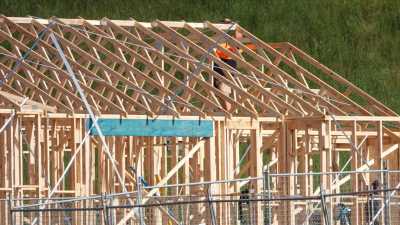Save articles for later
Add articles to your saved list and come back to them any time.
The Andrews government is reconsidering an urgent package of reforms to slash building industry red tape to boost the supply of houses and stave off a looming crisis for the sector.
Treasurer Tim Pallas held crisis talks with four Victorian building sector lobby organisations to discuss an overhaul of planning and building contract laws as part of a push to cut delays and lower the risk of growing cost blowouts for builders.
Treasurer Tim Pallas met with building industry representatives last Thursday to discuss reform options.Credit: Jason South
The meeting – with the Housing Industry Association, the Urban Development Institute of Australia, the Master Builders Association and the Property Council – marks a thawing of relations after the state government’s failed bid last year to introduce an $800 million social housing tax on major housing developments in exchange for streamlined planning processes.
Asked about the meeting, which was held on Thursday last week, a government spokesperson said the state’s building industry was facing substantial challenges.
“We’re always grateful for the opportunity to hear directly about the situation on the ground,” the spokesperson said. “We’ll continue to work with the industry, which is an important contributor to the state.”
It comes on the heels of the collapse of Porter Davis, one of Australia’s largest residential builders, leaving about 1700 unfinished homes in Victoria and Queensland. Other building companies have also come under duress from falling sales, rising costs, trade shortages and a market downturn, with economists and industry experts warning more pain could be in store.
Premier Daniel Andrews last week warned that public money should not be used to prop up an unviable company.
But the government is now reconsidering a package of reforms to help the sector.
Under the plan, which was shelved in March last year, developers would benefit from a faster assessment process for major projects, allowing them to bypass local government in cases where projects are large enough to warrant state oversight.
The government believes the changes have the potential to cut up to six months off planning permit applications, delivering about $7 billion in benefits and create tens of thousands of jobs over a decade. It is also considering an overhaul of Victoria’s antiquated Domestic Building Contracts Act, blamed for forcing overly prescriptive and outdated consumer protection clauses into home building contracts.
However, in March last year when the plan was scrapped, Pallas made it clear that the government was unwilling to consider such reforms unless some of the additional profits were returned to the public, potentially to pay for more social housing.
Housing Industry Association Victorian executive director Keith Ryan said new rules to speed up the planning process would be something the industry would be very happy about.
“That would certainly … provide a bit more certainty for people,” Ryan said.
“And whilst it’s not a magic solution, it would certainly help provide a bit of confidence to the industry.
Victorian Premier Daniel Andrews says public money should not be used to prop up unviable companies. Credit: Gus McCubbing
“Sales have dropped off quite dramatically with interest rate rises, and even if consumers were to decide tomorrow they were going to start buying homes again, because of all the delays of planning … it would still take a long time for those sales to actually translate into activity and work for builders.”
In February last year, Andrews accused the building industry of welshing on a deal to support the development levy in exchange for the planning reforms.
But since then, fresh concerns have emerged about the supply of new houses.
In a recent report, the National Housing Finance and Investment Corporation, the body charged with boosting the supply of housing, warned the Reserve Bank’s sudden and unexpected interest rate tightening cycle had cut the supply of new homes, predicting a shortage of 106,300 houses over the five years to 2027.
The Morning Edition newsletter is our guide to the day’s most important and interesting stories, analysis and insights. Sign up here.
Most Viewed in National
From our partners
Source: Read Full Article




